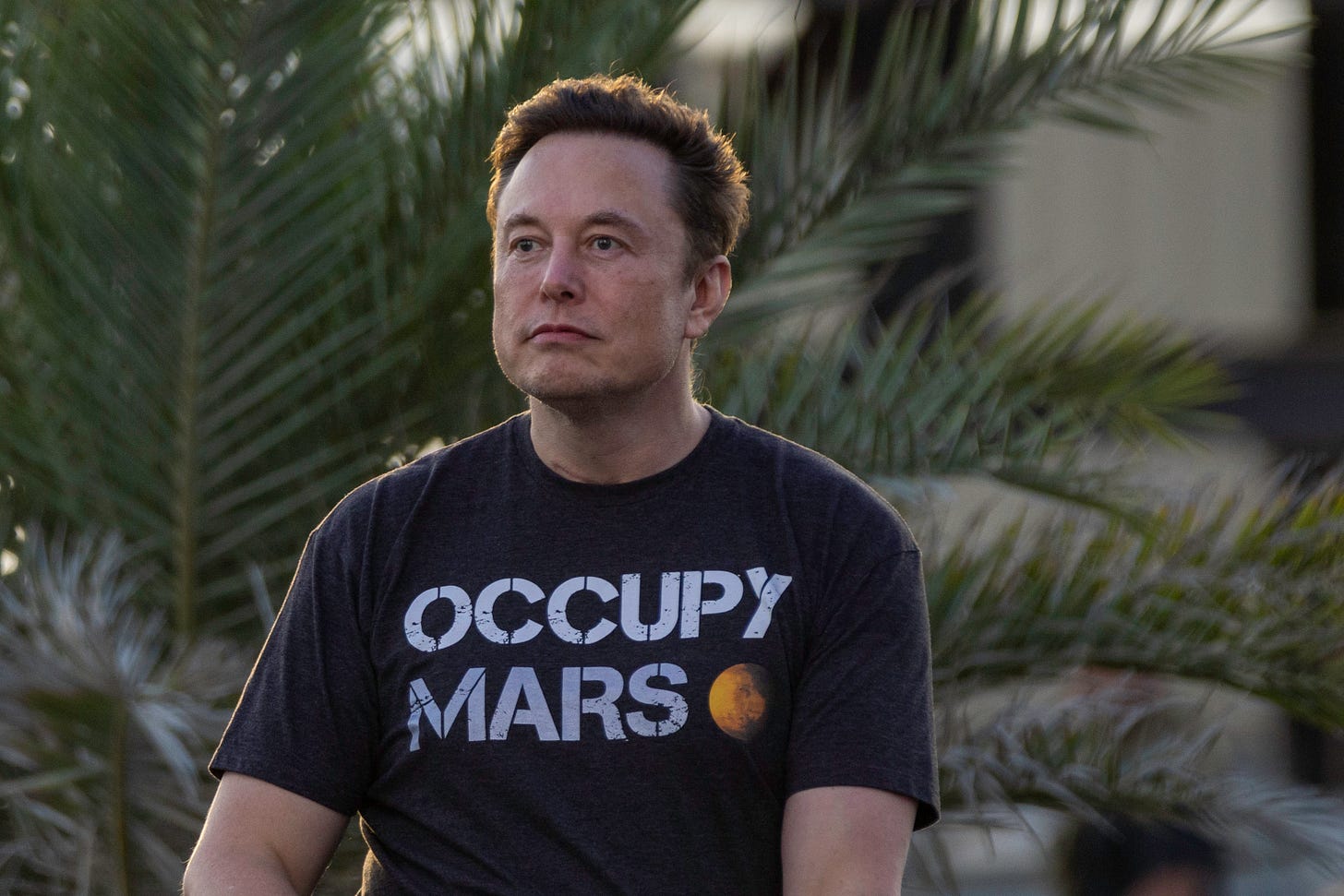Elon Musk Can't Unbias Twitter, but He Can Re-Bias It
And when he does, it's likely to get closer to the median voter.
Dear readers,
On Elon Musk’s first day as CEO of Twitter — now the third major company of which Musk is simultaneously serving as CEO — he announced the formation of a blue ribbon commission to figure out what to do about the whole moderation thing.

Of course, Twitter already has a Trust and Safety Council, but that council does not have “widely diverse viewpoints” in the sense that Musk means. Look at the list of organizations represented on the council, imagine a typical meeting, and then guess whether anybody in the room voted for Donald Trump in the 2020 election. I’m pretty sure no one did. That’s also probably true of a lot of regular staff meetings inside Twitter headquarters itself — nearly all of Twitter employees’ political donations go to Democrats.
“Over the course of his Twitter bid, he has at times styled himself a moderate, but also announced plans to vote for a Republican president in 2024,” the Washington Post wrote of Musk this week, as though those two claims were somehow in tension. That one sentence reveals a lot of what’s bizarre about the conversation about Twitter.
Media employees and incumbent Twitter employees alike tend view their world — one without Republicans — as the normal one, and the values and policies that get promulgated out of that world as the neutral and moderate ones. From their point of view, Musk — the electrification and decarbonization guy, who used to be for Obama but is now quite sour on Democrats — looks like a right-wing extremist who must want to turn the platform into Gab. As such the reaction to him taking over a platform is garment-rending and panic, even though his politics are a lot closer to the median voter’s than theirs are.

I have my own concerns about Musk’s likely stewardship of Twitter — in particular, I think his business interests make him likely to be too solicitous of the concerns of Chinese communists. I also think Musk has often been glib about the challenges of moderation, which is both impossible to get right and necessary to do anyway, for reasons laid out well here by Jon Askonas and Ari Schulman.1 But there is one fairly limited goal that I do think Musk is very likely to achieve: While it won’t be possible for Twitter to get out of the moderation business, and while nobody could possibly de-bias Twitter’s moderation decisions, I do believe Musk will be able to re-bias them in a way that better reflects the actually existing spectrum of political opinion in the United States.
I’m honestly a little baffled when people look at the record and the personnel involved in Twitter’s moderation decisions and deny that the company has shown a liberal bias. For example, Techdirt editor Mike Masnick seems to agree with virtually everyone that suppressing news stories about Hunter Biden’s laptop during the waning days of the 2020 campaign was a mistake, but he also insists the mistake didn’t arise from a judgment call — rather, he argues it was the necessary outcome from even-handedly applying a neutral policy (however ill-considered) about hacked materials:
As we’ve written a bunch of times, links to the NY Post story were blocked because of a belief that the story violated Twitter’s “hacked materials” policy. That policy had been in place for a while before the laptop story came out, and in fact we had criticized that policy specifically because it seemed clear that it could interfere with journalism in the public interest (and that had happened when Twitter banned an account for linking to leaked law enforcement documents — i.e., info that was embarrassing to cops, who tend to be more right wing than left wing, countering the narrative that Twitter only blocks pro-right wing info). Twitter eventually changed that policy, which was the right call. But, again, it shows that the company had a policy and enforced it against content that favored different political viewpoints. Indeed, not enforcing the same policy against the NY Post would have been an example of Twitter giving more leeway to conservatives than liberals.
The problem with this analysis is right in the first sentence of that quote: Twitter personnel held a belief that the stories violated their policy on hacked materials. But whether the stories violated the policy depended on the answer to a factual question whose answer could not then be known: Had Hunter’s laptop been hacked? As Andy Greenberg wrote in WIRED at the time, Twitter made assumptions here — the sorts of assumptions a liberal might have made, but a conservative surely would not have…
Keep reading with a 7-day free trial
Subscribe to Very Serious to keep reading this post and get 7 days of free access to the full post archives.



